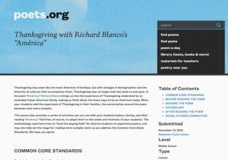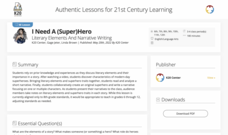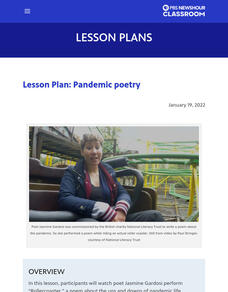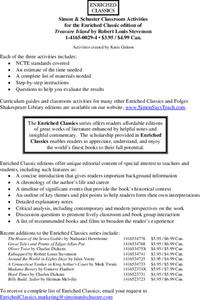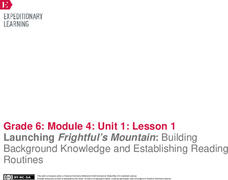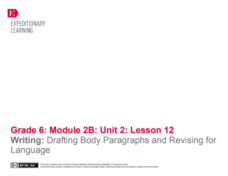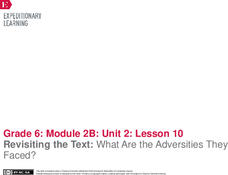Curated OER
Genre: Short Story
Discover the genre of short stories with sixth graders. They discuss the characteristics of short stories from the book America Street. Then, they compare and contrast movies and television shows and chart story characteristics. Various...
Curated OER
What is a mystery?
What is a mystery? Learners complete an anagram worksheet to discover the mystery genre. First, they listen as the teacher reads from All About Mysteries and notes defining words on the board. Then they read a mystery and examine it for...
Education City
Reading Comprehension
Celebrate National Reading Month in March—or any month of the year—with a selection of versatile graphic organizers. The worksheets prompt readers to compare characters easily, predict what will happen next in a story, track their...
Academy of American Poets
Thanksgiving with Richard Blanco's "América"
Traditions, like the times, are a-changin'. Middle schoolers conduct a close reading of Richard Blanco's poem "América" and consider how Blanco's family approached his suggestions for adopting a new approach to their Thanksgiving meal.
Penguin Books
A Guide to the Works of Jacqueline Woodson
The works of Jacqueline Woodson introduce readers to diverse characters and themes. A guide covers many of the author's best-known books such as Brown Girl Dreaming and Locomotion. Dive & Discuss and Explore & Extend activities...
K20 LEARN
I Need A (Super)Hero: Literary Elements And Narrative Writing
Need a hero? Super! Groups create their modern-day marvel and craft a narrative with all the elements required in such a tale.
Penguin Books
Educator's Guide: The Da Vinci Code by Dan Brown
Dan Brown's The Da Vinci Code is filled with secrets. Help readers find the clues, solve the riddles and puzzles, and unwrap the mysteries with a six-page guide that includes before, during, and after reading discussion questions and...
Wadsworth Atheneum Museum of Art
Where I'm From: Symbolism in Paint and Poetry
After a review of symbolism, class members use the provided worksheet to first list the objects they observe in Arnold Mesches' painting "Coney Island" and then suggest possible symbolic meanings for each of the objects. A second...
Academy of American Poets
Teach This Poem: "On Being Brought from Africa to America" by Phillis Wheatley
Phillis Wheatley's poem, "On Being Brought from Africa to America" is the focus of a lesson that asks readers to consider how the poem is a critique of slavery. Groups comprise a list of words and phrases they notice as well as questions...
Academy of American Poets
The African American Experience
Disrespect can be as subtle as a frown or a turn of a head. To prepare for a study of Toi Derricote's poem "The Weakness" class members create wordless skits that demonstrate subtle or not so subtle signs of disrespect. After a...
National Endowment for the Humanities
Theme Analysis in A Christmas Carol
Why does Charles Dickens have Ebenezer go from scrooge to light-hearted and generous? From "Bah, humbug!" to "God Bless Us, Every One!" After rereading Dickens' preface to A Christmas Carol, learners analyze quotations from the tale that...
National Endowment for the Humanities
Scrooge as He is Revealed during the Ghostly Experiences
Readers learn how to use both direct and indirect characterization clues provided by Charles Dickens to understand the complexity of Ebenezer Scrooge's character. Scholars collect evidence of comments Scrooge hears, how he responds to...
National Endowment for the Humanities
Language Analysis Based on Stave 1
Class members meet the original scrooge, the Dickens character whose name has become synonymous with a cold-hearted, tight-fisted, miser. Using the provided worksheet, readers closely examine context clues to determine the meanings of...
Simon & Schuster
Classroom Activities for The Call of the Wild by Jack London
Three activities are designed for readers of Jack London's The Call of the Wild. First, class members research and create posters that reflect the setting of the novel. Next, groups create posters with images that represent each chapter...
Simon & Schuster
Classroom Activities for Treasure Island by Robert Louis Stevenson
Readers take part in three activities after reading Robert Louis Stevenson's Treasure Island. To understand the importance of diction, class members analyze Stevenson's characters' language to denote their social status. After completing...
Academy of American Poets
Teach This Poem: “As I Walk These Broad Majestic Days” by Walt Whitman
Walt Whitman's poem "As I Walk These Broad Majestic Days" offers scholars an opportunity to practice their noticing skills. They first examine a postcard of the Newport News Shipyard listing things they notice about the image and how...
EngageNY
Launching Frightful’s Mountain: Building Background Knowledge and Establishing Reading Routines
Welcome to Frightful's Mountain. The teacher introduces scholars to the text Frightful’s Mountain by reading the first chapter aloud. Learners then talk with a partner about the text. The instructor models answering focus questions as...
EngageNY
Analyzing and Discussing: Modern Voices
This is the way we go to school. Scholars take a look at two poems about different ways to get to school, TyrannosaurBus Rex and Point A to Point B. Pupils work in triads to analyze the poem images and determine the theme.
EngageNY
Launching Modern Voices: Concrete Poetry
Challenges are different for today's kids. Learners begin to think about their own challenges by examining the adversities faced by children in medieval villages. They complete a graphic organizer as they watch the video Hackschooling...
EngageNY
Writing: Drafting Body Paragraphs and Revising for Language
This is a formal affair. Scholars take a look at using formal writing in essays. They analyze the model essay Are We Medieval?: Opportunities in the Middle Ages and Today? They then begin working on the first draft of their own essays.
EngageNY
Examples from Life Today
Does that happen in real life? Scholars look at their Themes of Adversity graphic organizers and think of examples in today's world for each type of adversity. They determine if today's world has the same struggles as those in the Middle...
EngageNY
Revisiting the Text: What Are the Adversities They Faced?
Where's the evidence? Scholars take a look at the evidence section of a Literary Argument Essay Rubric. They discuss terms used in the rubric and then begin thinking about collecting evidence for their own essays. They also revisit their...
EngageNY
Qualities of a Strong Literary Essay
Put it all into words. Scholars work toward writing an argumentative essay. They begin by examining and marking strong words in Are We Medieval? A Literary Argument Essay Prompt. Learners then use Qualities of a Strong Literary Argument...





